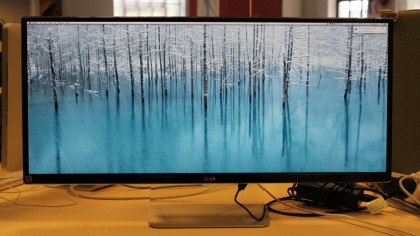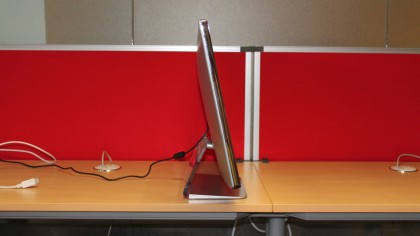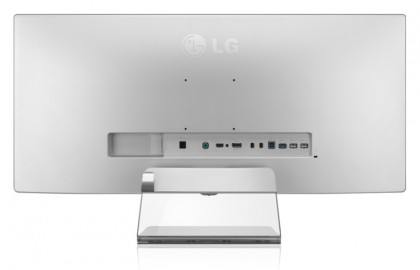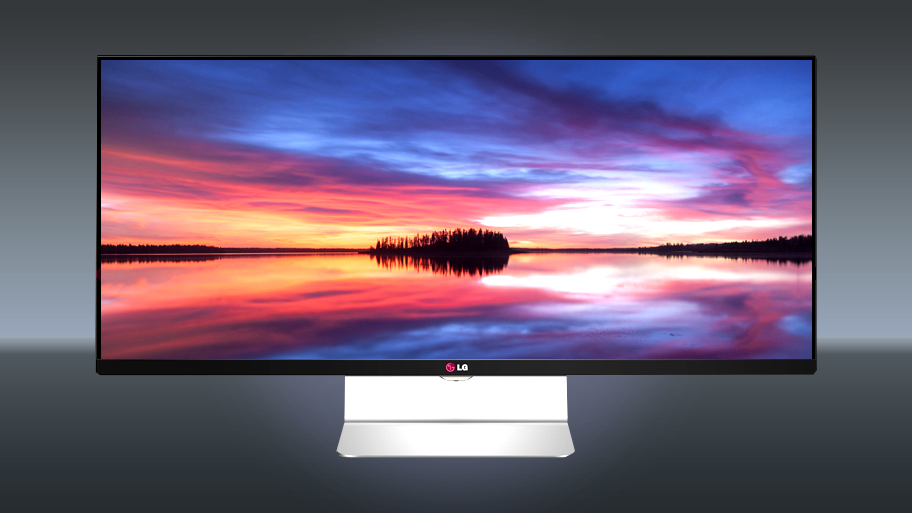TechRadar Verdict
The 34UM95 finally does 21:9 justice, featuring a huge working area free of scaling issues, low input lag and high colour accuracy wrapped up in an attractive design. It's not the cheapest of its kind, but it goes some way to justifying the cost.
Pros
- +
Tall 21:9
- +
100% sRGB
- +
Attractive design
- +
Port selection
- +
Low input lag
Cons
- -
Expensive
- -
No adjustable height
- -
Speakers lack bass
Why you can trust TechRadar
When the first wave of UltraWide 21:9 monitors landed back in 2012, it felt like one step forward and one step back.
One the one hand, the extra desktop real estate at the sides meant that you could replace your dual monitor setup with a single display, doing away with the distracting middle bezel that would divide your two working areas. This was useful for stretching out spreadsheets, snapping documents side-by-side or watching movies in their native "cinematic" aspect ratio.
However, due to their common pixel-resolution of 2560 x 1080, such monitors suffered from a lack of vertical space and resulted in what felt like a cramped letterbox-like working area compared to 1440p panels. What's more, on average they were more expensive than their 16:9 counterparts and as such many people found it difficult to justify the cost of getting onboard with the intruiging aspect ratio.
- Interview: LG talks to TechRadar Pro about the 34UM95
Step up the LG 34UM95, which goes by the mantra of bigger is better - both in terms of physical size and resolution - which have been upped to 34 inches and 3440 x 1440 (21:9) respectively. This larger working area is the equivalent of running two 20-inch monitors side-by-side with resolutions of 1720x1440 (6:5).
Finally, 21:9 gets the vertical space that was sorely lacking from previous models, matching what you would find on a 27-inch monitor while providing even more horizontal space at the sides. The UM3495's working area really is huge. At 109ppi, it also has an advantage over 4K in that, despite not being as sharp, on-screen text and UI elements are perfectly readable without having to adjust your operating system's scaling settings.

However, its price will still prove a stumbling block for many. At £800 (around $1,289 or AUS$1,389), the 34UM95 is even more of a niche buy than the last wave of 21:9 offerings, which cost less than half the price. WIth the falling cost of 4K monitors (set to become even lower due to to Intel's partnerships with various manufacturers), you could almost bag yourself two of them for the equivalent cost and place them side-by-side.
But that's missing the point: if you're a multimedia editor, productive office worker, movie lover, gamer or anybody who needs ample screen real-estate and tons of features in an attractive, super-wide panel, there's plenty of plus points to be found in the 34UM95.
Sign up to the TechRadar Pro newsletter to get all the top news, opinion, features and guidance your business needs to succeed!
Design
The 34UM95 is very elegantly designed and one of the most eye-catching 21:9 monitors yet. Although it's taller and wider than previous 21:9 monitors, it's still surprising at how short it is. With a height of just 173mm, it's not as overbearing as 27- or 30-inch monitors and you don't have to sit as far back from it, making it a better fit for smaller desks.
At 7.7Kg, it's surprisingly light too, easily liftable with a single hand. The screen is surrounded by a black bezel that houses LG's logo on the bottom edge's centre. That bezel is reflective and picks up fingerprints easily, but as the monitor's menu controls are operated using a menu stick on the underside you won't be leaving too many marks on it, and they're easy to wipe off.

The panel rests on what LG calls a "crystal floating stand", which is made of a see-through perspex material. It's attractive and clearly inspired by the Mac's design, but it means you only have two positions of height that can be adjusted by taking out the screws and moving the panel to a different position. In the absence of adjustable height, you'll have to put books underneath it if you want it to sit higher.
Performance and features
The display is an IPS variety with 1.07 billion colours, brightness of 1000:1 and excellent 178-degree viewing angles. It has rich colours that "pop" and produces deep blacks. Tested with our colour calibrator, the 34UM95 covered 100% of the sRGB channel, making it a highly accurate offering out of the box.
The 34UM95 has very low input lag of 5ms, making it suitable for gamers looking to play at high resolutions using a single graphics card (rather than a dual GPU setup as would be needed to game in 4K). The monitor will also support 60Hz refresh rates over DisplayPort set to its native resolution (HDMI is 1.4a, so it's limited to 30Hz).
Spin the 34UM95 around and you'll find a headphone jack, HDMI, DisplayPort, two Thunderbolt ports, four USB ports and a Kensington security lock. It's the first non-Apple monitor to feature Thunderbolt 2 and also supports the new Mac Pro. LG is clearly trying to position it as an alternative to Apple's ageing 27-inch Thunderbolt display, and in my eyes it's by far the more modern and attractive offering. If you are running a Mac, you'll need to update to at least Mavericks 10.9.3 to run it at native resolution over DisplayPort.

Under the bezel is a joystick that's used to navigate the menu controls. It's superbly implemented and is a far simpler and more effective way of cycling through on-screen menus than touch-sensitive controls, and I wish every vendor would take this route. Its two inbuilt speakers are good for an integrated offering, but their lack of bass means that you're still better off with a dedicated soundbar or 2.1 (with subwoofer) speaker system.
Final verdict
The LG34UM95 is an expensive 21:9 monitor, but it pulls out of all of the stops to justify the cost. The basics are done well: from its high colour accuracy to intuitive menu controls. Throw in a wide range of ports and fast response times wrapped up in an eye-catching design, and it offering becomes the 34-inch 21:9 offering to beat. If you prefer the idea of a single monitor to replace your multi-monitor setup, the 34UM95 is an excellent, no-holds-barred option.

